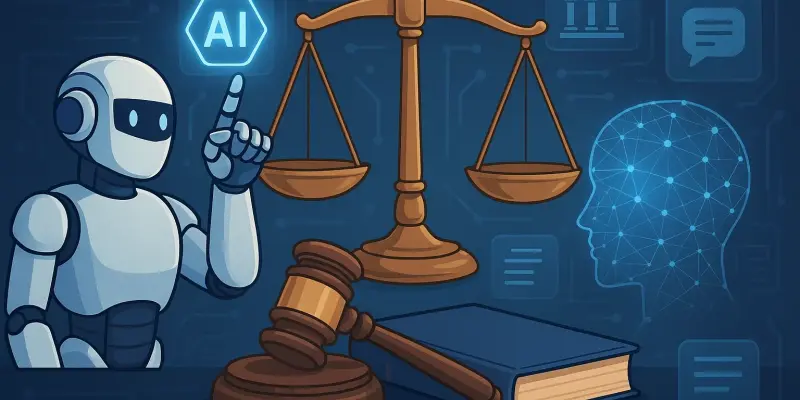Artificial Intelligence (AI) has become an increasingly integral part of the legal industry, reshaping how professionals operate and improving the quality of their work-life balance. Recent advancements in AI technology are rapidly transforming legal processes, prompting both excitement and apprehension among legal professionals. This revolution extends beyond mere automation; AI fosters strategic thinking among lawyers by relieving them from mundane tasks, thus providing opportunities for enhanced career paths and improved communication within teams. Despite a slight decline in overall AI usage among legal professionals this year, those who continue to leverage AI report substantial benefits and increased efficiency in achieving their business objectives.
The legal profession has long been synonymous with high stress, demanding deadlines, and frequent burnout. Many lawyers find themselves overwhelmed by the sheer volume of tasks, leading to job dissatisfaction that has increased noticeably. However, AI presents a promising solution to mitigate such challenges. AI’s ability to streamline workflows, coupled with its capacity to improve communication, has made it a valued asset. In particular, younger generations of legal professionals who are adept at using technology show a significant reduction in burnout, while older generations are also acknowledging the benefits, albeit to a lesser extent. As AI evolves, it is poised to further transform the legal landscape, making it more dynamic and efficient than ever before.
Enhancing Efficiency and Strategic Operations
Artificial Intelligence has emerged as a transformative force in legal operations by automating repetitive tasks and freeing professionals to engage in more substantive, strategic work. Among the manifold applications, AI excels in summarizing case law, performing document and contract reviews, conducting research, and executing contract analytics, which are all critical functions within the legal domain. With the help of AI, lawyers can delegate routine assignments to technology, thereby allocating more time for complex, strategic, and intellectually stimulating endeavors. Over the past years, there has been a notable increase in AI deployment for tasks such as contract analysis and review, underscoring its burgeoning role in enhancing operational efficiencies across the industry.
Apart from improving workflow speed and accuracy, AI significantly boosts job satisfaction among lawyers. By shifting focus from monotonous actions to more meaningful work, legal professionals experience reduced stress and enhanced engagement with their roles. A sizable portion of AI users in the legal sector affirm that AI has enabled them to become more strategic thinkers. This sentiment corresponds with the 19% year-over-year increase in individuals reporting that AI enhances their ability to concentrate on higher-level strategic matters instead of getting bogged down by mundane duties. The evolution of AI technology is expected to continuously augur improvements in legal practices, fostering a shift from micro-management to strategic leadership.
Alleviating Burnout and Empowering Communication
As the legal profession grapples with increasing job dissatisfaction and burnout, AI emerges as a quintessential tool in remedying these concerns. The relentless pace of work and tight deadlines contribute to the elevated levels of stress experienced by legal professionals. Though challenges remain, AI’s impact on alleviating burnout by streamlining workflows and facilitating better workload management is noteworthy. A striking number of professionals acknowledge AI’s efficacy in reducing feelings of exhaustion and stress associated with their jobs. While in-house teams notice a more pronounced benefit, law firms are also registering positive feedback, despite occasionally wavering adoption rates. Beyond improving workflow and efficiency, AI substantially enhances communication, a critical element in legal work that often involves intense collaboration and precise exchange of information. The technology aids professionals in developing clearer, more competent communication channels, essential for maintaining effective business relationships and garnering career growth opportunities. With 64% of respondents citing improved communication abilities due to AI, it is evident that these advancements are positively influencing both workplace dynamics and professional development. Not only does AI encourage better communication within organizations, but it also facilitates improved business relationships, augmenting legal professionals’ visibility and credibility within their respective environments.
Balancing AI Benefits and Implementation Challenges
Artificial Intelligence (AI) has increasingly become an essential component of the legal industry, revolutionizing how professionals work and enhancing their quality of life. Recent advances in AI are swiftly transforming legal processes, bringing both enthusiasm and concern among legal experts. This change goes beyond basic automation; AI encourages strategic thinking by freeing lawyers from routine tasks, offering better career development and fostering team collaboration. Despite a slight downturn in AI usage in the legal field this year, those who persist in using AI report significant advantages, including higher efficiency in meeting business goals. Historically, the legal profession is known for its high levels of stress, pressing deadlines, and frequent burnout. Many attorneys feel inundated with work, leading to increased job dissatisfaction. AI offers a hopeful remedy for these issues by streamlining workflows and improving communication, making it a valuable tool. Younger attorneys, who are tech-savvy, experience less burnout, while older professionals are also starting to see the benefits. As AI advances, it promises to further invigorate and enhance the legal sector.

